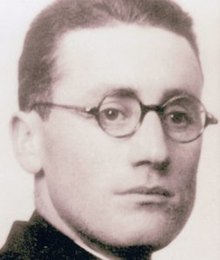José María Arizmendiarrieta
show This article may be expanded with text translated from the corresponding article in Spanish. (May 2019) Click [show] for important translation instructions. |
This article includes a list of general references, but it remains largely unverified because it lacks sufficient corresponding inline citations. (December 2017) |
José María Arizmendiarrieta | |
|---|---|
 | |
| Born | 22 April 1915 Markina-Xemein, Biscay Spain |
| Died | 29 November 1976 Arrasate, Gipuzkoa, Spain |
| Honored in | Catholic Church |
| Feast | 29 November |
Father José María Arizmendiarrieta Madariaga (22 April 1915 – 29 November 1976) was a Basque Catholic priest and founder of the Mondragón Corporation, the largest cooperative in the world, in Gipuzkoa, present-day Basque Autonomous Community.[1]
He is considered Venerable in the Catholic Church.
Biography[]
Arizmendiarrieta, whose name is often shortened to "Arizmendi", was born in Barinaga, Markina-Xemein, Biscay, the eldest son of a family of modest means. He had lost an eye in a childhood accident so could not be a soldier. Instead he was a journalist for Basque language newspapers. His actions caused him to be arrested after the Spanish Civil War and he was sentenced to death for his activities; legend has it that he escaped the firing squad only through an administrative oversight. Released, he returned to his studies in Vitoria and went on to take holy orders.[citation needed]
Arizmendi wanted to continue his studies in Belgium but was assigned to a parish 30 miles from his own home town. He arrived in Arrasate (in Spanish, Mondragón) in February 1941, as a 26-year-old newly ordained priest to be assistant curate, to find a town still suffering from the aftermath of the Civil War and severe unemployment.
Arizmendi did not impress his new flock. Their one-eyed priest read badly; one parishioner described him thus: "He spoke in a monotone with intricate and repetitive phraseology difficult to understand. He hardly ever [read] with grace."[citation needed] They initially asked the Bishop to replace him. Nevertheless, he was determined to find a way to assist his congregation and realised that economic development - jobs - was the key to solutions to the town's other problems. Co-operatives appeared the best way to achieve this. Co-operatives, both consumer and worker, and self-help organisations had a long tradition in the Basque Country but had died away after the War.[citation needed]
In his quest for community welfare, he started to focus his efforts on vocational training, such as the school providing , a flagship factory of Arrasate. However, his attempts to enhance and expand the school were not welcomed by the management. He focused instead on creating another school, for which he relied on donations and popular subscription. In 1943, Arizmendi set up a Polytechnic School,[2] now the Mondragón University, a democratically administered educational centre open to all young people in the region.[citation needed]
The Polytechnic School provided the springboard for students of different backgrounds to new jobs apart from the Unión Cerrajera. Now Arizmendiarrieta was intent on creating a company catering to the positions required by the students graduating from the School. That took the name of Ulgor, after the initials of the entrepreneurs embarking on the venture. It transformed soon on into Fagor.[citation needed]
Arizmendi died in 1976 in Arrasate.[citation needed]
On 14 December 2015, Arizmendiarrieta was decreed to be of heroic virtue by Pope Francis and became Venerable in the Catholic Church.[3]
See also[]
- Mondragon Corporation
References[]
- ^ Kontrast.at (8 March 2020). "Mondragón: One of Spain´s largest corporations belongs to its workers". scoop.me. Retrieved 29 November 2020.
- ^ Jose Mª Arizmendiarrieta. Archived 8 December 2009 at the Wayback Machine Mondragon Corporation.
- ^ "17 sainthood, beatification causes advance". CatholicCulture.org. Catholic Culture. Retrieved 29 October 2020.
Sources[]
- Joxe Azurmendi: El hombre cooperativo (in Spanish)
- Azurmendi, Joxe 2016: "Pertsona kooperatzaileaz" in Gizabere kooperatiboaz, Donostia: Jakin ISBN 978-84-95234-96-4 (in Basque)
- Iban Galletebeitia: "Ereiterik bada desertuan, J.M. Arizmendiarrieta" in Alaitz Aizpuru(koord.), Euskal Herriko pentsamenduaren gida, Bilbo, UEU 2012. ISBN 978-84-8438-435-9 (in Basque)
External links[]
- 1915 births
- 1976 deaths
- People from Lea-Artibai
- Basque-language writers
- Basque Roman Catholic priests
- Cooperative organizers
- 20th-century Roman Catholic priests
- Mondragon Corporation
- 20th-century venerated Christians
- Venerated Catholics by Pope Francis